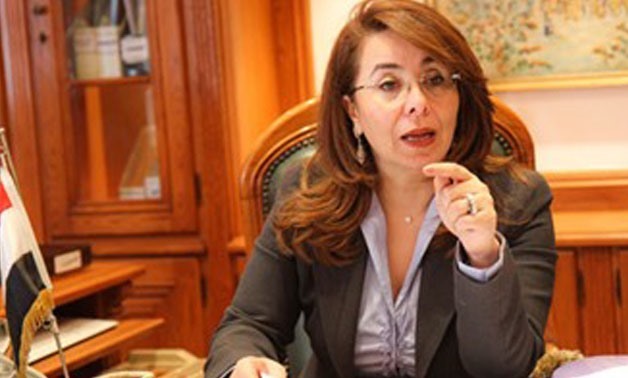
FILE - Minister of Social Solidarity Ghada Wali
CAIRO - 18 May 2019: The cabinet approved on Wednesday a draft law regulating civil work in Egypt. The House of Representatives will receive the draft within this week.
The current law was promulgated in June 2017; however, President Abdel Fatah al-Sisi announced in November 2018 during his participation in the second edition of the World Youth Forum (WYF) that the bill will be amended. The president had agreed to form an official committee that holds social dialogues on articles of the law and conducts relevant studies.
In November 2016, the House of Representatives passed the law after two thirds of members had voted in favor of the draft. Nevertheless, the law was enacted after the endorsement of the president the following year to substitute law no. 84/2002.
Main Aspects of the Draft
Minister of Social Solidarity Ghada Wali told media that the draft law ensures control and follow-up, promotes transparency, and does not include custodial penalties. It allows the establishment of associations of resident foreign communities, and guarantees the right of associations to establish and contribute to charitable companies and funds.
Wali added that the new draft law increased the participation of foreigners in the boards of associations to 25%, and allowed the establishment of associations of resident foreign communities in Egypt. As well as the possibility of opening branches of associations abroad after licensing them, and opening branches and offices within the notification, and allows the establishment of companies or investment funds and contribute to charity.
The law grants associations the right to receive cash from inside Egypt from natural or legal persons of Egypt or foreign non-governmental organizations authorized to operate inside Egypt. The associations are allowed to receive donations from natural or legal persons inside or outside the country after notification to the administrative authority, and the absence of a reply will be taken as consent. Wali also pointed out that the draft law supports the principle of transparency and emphasizes the need to publish budgets and the final account in detail with the commitment to governance, and obliged them to open a bank account in one of the banks subject to the supervision of the Central Bank.
The new law consolidates the authorities responsible for overseeing the civil society institutions in one area, and the foreign non-governmental permission to practice one or more of the activities of associations and NGOs subject to the provisions of the law. Wali pointed out that the new law exempts the built-up properties of the association from all real estate taxes, exemption from customs tariffs, and other fees imposed on imported devices, machines, equipment, and supplies of production and cars. The new law enacts voluntary work by opening a door for volunteering.
The Drafting Process
The law-making journey included the use of 18 laws from 18 countries and community dialogue tours involving more than 1,000 civil associations representing all governorates of Egypt.
Wali stated that the committee held more than 20 meetings to the conclusion of the necessity of drafting a new law, and not just amendments to Law 70 of 2017.
That is because the current stage needs a new philosophy that opens the doors to wide participation in nation-building, and to provide opportunities to participate in the establishment of civil associations and create the space for existing institutions for further work as well as encouraging volunteer values and protecting volunteers.
Seven tours of community dialogue were held, four of which were held in different governorates of Egypt such as Cairo, Alexandria, and Ismailia.
The Upper Egypt associations participated in a dialogue in Menia governorate; four major associations implemented these dialogues in cooperation with the Ministry of Social Solidarity and the General Federation of Societies. In which 1164 associations took part, in addition to central dialogues held at the Ministry of Social Solidarity, attended by opinion leaders, experts and civil society leaders, and more than 70 international organizations licensed to work in Egypt participated in another dialogue.
The end of the rounds of community dialogue organized by the National Training Academy and included a number of diverse youth streams. In addition to informing the law preparation committee of similar international experiences, where the use of 18 laws from 18 countries in implementation of the mandate of the president, which included access to international experiences in the organization of civil work.
Wali said that the law opens the floodgates to participate in nation building, organizes volunteerism, protects volunteers, allows new activities and fields, regulates the activities of foreign communities, and regulates professional certification, noting that all custodial articles have been abolished, except for financial and administrative penalties.
Wali also pointed out that the presidential support was not limited to calling for the amendment of the legislation in a way that provides a supportive atmosphere, but at the level of actual empowerment, it directed the government to fund projects implemented by the associations to participate in human development and nation development.

Comments
Leave a Comment